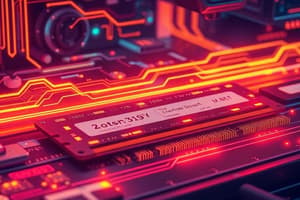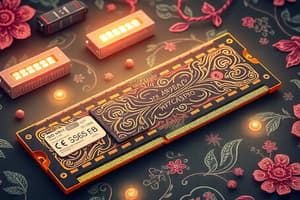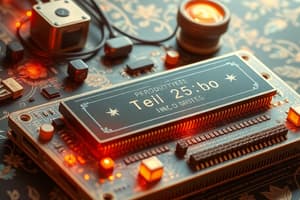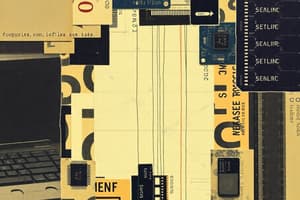Podcast
Questions and Answers
The output unit converts the data entered by the user into computer understandable form
The output unit converts the data entered by the user into computer understandable form
False (B)
A ______ monitor looks like a television and are normally used with non-portable computer systems.
A ______ monitor looks like a television and are normally used with non-portable computer systems.
CRT
______ is the raw material used as input and ______ is the processed data obtained as output of data processing.
______ is the raw material used as input and ______ is the processed data obtained as output of data processing.
Data, information
Any electronic holding place where data can be stored and retrieved later whenever required is ______
Any electronic holding place where data can be stored and retrieved later whenever required is ______
MAR stands for ______
MAR stands for ______
Optical disks are proved to be a promising random access medium for high capacity secondary storage
Optical disks are proved to be a promising random access medium for high capacity secondary storage
The technology used in optical disks is ______
The technology used in optical disks is ______
Rotation of the disk must vary ______ with the radius of the disk
Rotation of the disk must vary ______ with the radius of the disk
The tracks are divided into sectors whose size ______
The tracks are divided into sectors whose size ______
A kilobyte (KB) is 1024 byte
A kilobyte (KB) is 1024 byte
Flashcards
What is CamScanner?
What is CamScanner?
CamScanner is a mobile app that allows users to scan documents, and it converts them into digital formats like PDF, JPG, and more.
How does CamScanner work?
How does CamScanner work?
The app uses your phone's camera to capture images of documents, photos, or other materials.
What are some features of CamScanner?
What are some features of CamScanner?
CamScanner offers features like image enhancement, cropping, and color adjustments to make your scanned documents clear and readable.
Where can you save your scanned documents?
Where can you save your scanned documents?
Signup and view all the flashcards
How can you organize your documents in CamScanner?
How can you organize your documents in CamScanner?
Signup and view all the flashcards
Can you convert formats with CamScanner?
Can you convert formats with CamScanner?
Signup and view all the flashcards
Can you merge scans into one document?
Can you merge scans into one document?
Signup and view all the flashcards
What kind of subscription options are available?
What kind of subscription options are available?
Signup and view all the flashcards
Who uses CamScanner?
Who uses CamScanner?
Signup and view all the flashcards
What is the main benefit of CamScanner?
What is the main benefit of CamScanner?
Signup and view all the flashcards
How does CamScanner simplify scanning?
How does CamScanner simplify scanning?
Signup and view all the flashcards
Is CamScanner easy to use?
Is CamScanner easy to use?
Signup and view all the flashcards
What are some ways CamScanner helps with scan quality?
What are some ways CamScanner helps with scan quality?
Signup and view all the flashcards
How can you easily access your documents on CamScanner?
How can you easily access your documents on CamScanner?
Signup and view all the flashcards
How does CamScanner help with document organization?
How does CamScanner help with document organization?
Signup and view all the flashcards
How can you share your scans with others?
How can you share your scans with others?
Signup and view all the flashcards
What are some benefits of a paid CamScanner subscription?
What are some benefits of a paid CamScanner subscription?
Signup and view all the flashcards
Who are some common users of CamScanner?
Who are some common users of CamScanner?
Signup and view all the flashcards
How does CamScanner replace traditional scanners?
How does CamScanner replace traditional scanners?
Signup and view all the flashcards
What makes CamScanner a convenient document management tool?
What makes CamScanner a convenient document management tool?
Signup and view all the flashcards
What makes CamScanner user-friendly?
What makes CamScanner user-friendly?
Signup and view all the flashcards
How does CamScanner enhance the readability of scanned documents?
How does CamScanner enhance the readability of scanned documents?
Signup and view all the flashcards
How does CamScanner make sharing and accessing documents easy?
How does CamScanner make sharing and accessing documents easy?
Signup and view all the flashcards
What is the benefit of organizing documents in CamScanner?
What is the benefit of organizing documents in CamScanner?
Signup and view all the flashcards
What are some ways you can easily share documents using CamScanner?
What are some ways you can easily share documents using CamScanner?
Signup and view all the flashcards
What are the main features of CamScanner's paid version?
What are the main features of CamScanner's paid version?
Signup and view all the flashcards
What are some common uses for CamScanner?
What are some common uses for CamScanner?
Signup and view all the flashcards
Study Notes
Computer Peripherals
- A CPU is not a peripheral device
- A keyboard is a peripheral device
- A monitor is a peripheral device
- A mouse is a peripheral device
System Unit
- A port allows data transfer between devices and the computer
Computer Memory
- ROM is a type of computer memory where a user cannot write new information
- ROM is a non-volatile memory
Data Units
- A group of 8 bits is called a byte
Memory Units
- A megabyte is equivalent to 1,024 * 1,024 bytes
Computer System
- Device drivers allow input/output devices to communicate with the computer system.
Computer Memory Types
- The two basic types of computer memory are primary and secondary
Optical Disks
- A CD is a non-erasable disk that stores digitized audio information
Computer Operations
- Outputting is the process of creating useful information for the user
- The output unit converts user data into a computer-understandable format.
- Scanners are used to convert printed documents into a digital format.
Data Units
- The smallest unit of data in a computer is a bit
Input Unit
- The input unit reads instructions and data from the outside world
Raw Material
- Input and data are the raw materials used in data processing
Computer Characteristics
- A computer's characteristics include speed and accuracy, not IQ
- Computers do not have IQ
Memory
- Memory is the electronic holding place that stores data for later retrieval
Memory Size
- Size of main memory is determined by the address bus
- Secondary memory is independent of the address bus
MAR
- MAR stands for Memory Address Register
Optical Disks
- Optical disks are considered a promising random access medium for high capacity secondary storage
- The technology used in optical disks is a laser beam
Optical Disk Storage Capacity
- The storage capacity of an optical disk is calculated by multiplying the number of sectors by the number of bytes per sector
Disk Rotation
- The rotation of a disk varies inversely with the radius of the disk
Disk Sectors
- The size of disk sectors remains the same
Optical Disk Access Times
- The range of access times of optical disks is usually between 100 and 300 milliseconds
Optical Disk Technology
- Optical disks use a laser beam
Computer Input/Output
- Input devices are used to input data into a computer system
- Output devices are used to display information.
Computer Memory
- A computer's memory is used to store the data and programs required by the processor for immediate use.
Operating Systems
- An operating system is a suite of programs that control the basic functions of the computer system.
- Windows 2000 was the first preemptive multitasking operating system.
- Booting involves loading the operating system into a personal computer.
- The operating system is not an example of an application software.
Computer Classification
- A maxicomputer is not a computer classification.
- End-users are computer users who are not professionally trained in computer sciences.
Computer Components
- The central processing unit (CPU) is in charge of the computer and how it operates.
Computer Data and Information
- Raw data is the data before processing. Information is used by humans, computers work with data.
- The computer coordinates all components with the control unit.
- A modem is a type of device that converts digital signals to analog signals, allowing connection of computers to phone lines
Computer Components and Function
- A computer's CPU has a control unit and arithmetic/logic unit that handles different tasks. -The control unit retrieves data and instructions from memory and sends them to the ALU for processing, then sends the results back to memory.
Computer Terms
- A byte is a group of eight bits.
- RAM is the random access memory, and is a temporary storage area.
- Cache is a component that speeds up data transfer
- A bit is a single binary digit, used in computer codes.
- A byte is often made up of eight bits and used to measure digital files on a computer.
- A megabyte is often made up of 1,000,000 bytes and refers to a larger file.
- CPU speed is most commonly measured in megaHertz.
- A CPU is a complex arrangement of circuitry and millions of transistors.
- A storage device can hold data for long periods of time.
- A network interface card (NIC) is a component that connects each computer to the network wiring to provide a means of transferring data.
- A peripheral device is an additional component outside of the central processing unit.
- The control unit retrieves data from secondary storage such as a hard disk and puts it into memory.
- A program is stored in primary storage such as memory, to allow the computer to manage it properly when needed.
- A computer follows a path which is a way to find a specific file.
- A site license is a document that allows the software owner to put the program on more than one computer.
- An analog wave constantly fluctuates, unlike digital, which is on or off.
Studying That Suits You
Use AI to generate personalized quizzes and flashcards to suit your learning preferences.




